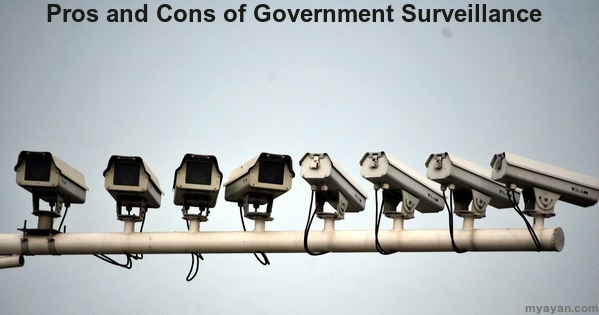The idea of government surveillance has been a controversial topic for years, and it is not hard to understand why. On one hand, surveillance can be an essential tool for national security and public safety. On the other hand, it can pose a threat to personal privacy and civil liberties. Government’s intentions behind enforcing surveillance is always justified. But sometimes, it goes beyond ethics. Pegasus spyware was the latest cyber threat that affected 45 countries worldwide. These pros and cons of government surveillance examine how it has been used in different countries around the world.
The pros of government surveillance include:
Surveillance can be an effective tool to help prevent criminal activities and acts of terrorism. Governments can use cameras to monitor public areas, track online movements, and intercept communication between suspects. By doing so, they can detect and stop potential threats before they occur, ensuring public safety.
Surveillance can also be used to collect evidence that can be used in court cases. For example, surveillance camera footage can be used as proof in a criminal trial, and intercepted communication between suspects may provide crucial information about their plans or motives. In this way, surveillance helps the judicial system to make informed decisions based on solid evidence.
The knowledge that the government monitors people’s activities can deter criminal behavior. People may think twice before committing a crime if they know the authorities will monitor and record their actions.
By monitoring public areas, the government can identify potential threats and take action to ensure public safety. For example, surveillance cameras can help police detect suspicious activities in high-crime neighborhoods or alert authorities about possible terrorist attacks.
Government surveillance can help emergency services respond to incidents faster. For example, if a car accident is caught on camera, the authorities can quickly locate the scene and send the necessary personnel to assist.
Though a government intends to protect its population, sometimes the monitoring activities go too far, which causes public unrest. Here are some of the prominent cons of government surveillance.
The most obvious downside of government surveillance is that it invades people’s privacy. By monitoring their activities, the government intrudes into their personal lives and may collect information they do not want to share.
There are also concerns about the potential for abuse of power by those in charge of surveillance operations. For example, there have been cases where authorities have used surveillance to spy on political opponents or those who disagree with the government’s policies.
Surveillance operations can be costly for taxpayers, as they require a lot of resources and workforce to maintain. In addition, the technology needed to carry out surveillance is often expensive and may only be available in some countries.
Surveillance can also lead to inaccurate information, as the technology is often not 100% accurate. For example, cameras may fail to detect an incident or group of people, and intercepted communication may be misinterpreted. This can lead to false convictions or unnecessary investigations.
Government surveillance can lead to a loss of trust in the authorities. People may be reluctant to share information with the government if they feel their privacy needs to be respected and their activities are constantly monitored.
Despite the obvious pros and cons of government surveillance, the answer to the question of whether or not it's acceptable for governments to watch our activities so closely is ultimately yours. Whichever side of the issue you stand on is what ultimately matters. So ensure you understand what’s at stake depending on the criticality of the situation. If you’re thinking about protesting or just starting a petition, at least take a minute to consider all sides of this complex debate before jumping into action.

Surveillance cameras offer numerous benefits, including heightened security and safety, deterring criminal activity, and providing valuable evidence for investigations. However, they also raise concerns about invasion of privacy, potential misuse or abuse of the technology, and the associated installation and maintenance costs.
Mass surveillance fosters an atmosphere of doubt and intimidation, prompting innocent individuals to alter their conduct, including their actions, speech, and communication. This phenomenon, often called the chilling effect, highlights the far-reaching impact of such surveillance practices.
Untargeted and targeted surveillance often face accusations of unfairly treating innocent individuals as suspects, violating human rights, international treaties, conventions, and national laws, and failing to pursue security effectively.
Section 702 of the Foreign Intelligence Surveillance Act grants the U.S. government the authority to conduct extensive, non-consensual surveillance on the international communications of American citizens. This includes monitoring phone calls, text messages, emails, social media interactions, and web browsing activities.